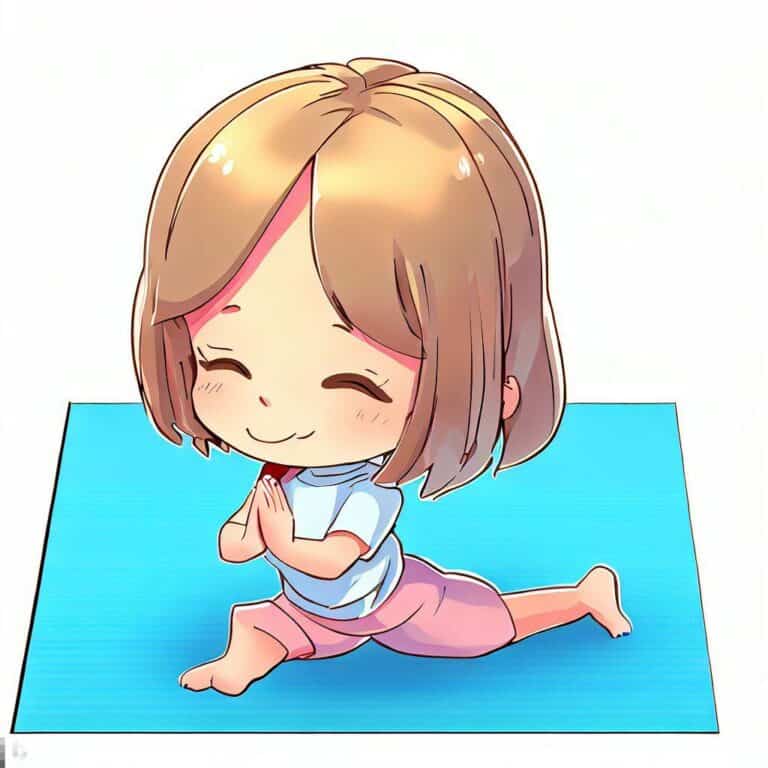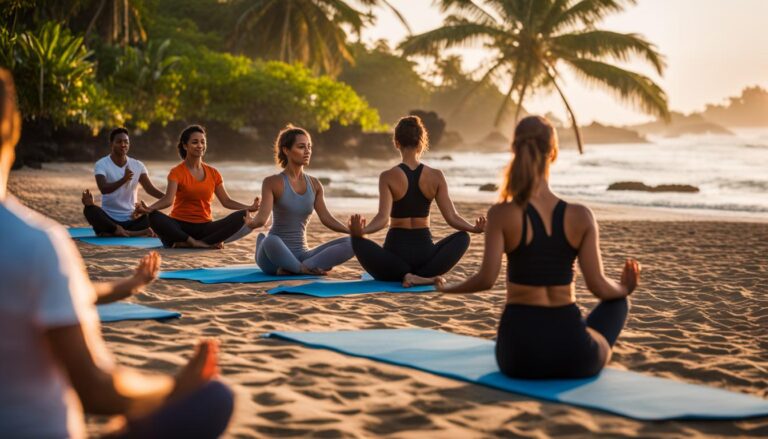Yoga Teacher Training Ubud: Enhance Your Skills and Deepen Your Practice
The content on this blog may contain affiliate links. If you choose to purchase through these links, I may receive a commission at no extra cost to you. Thank you for supporting my work!
Embark on a transformative journey in the spiritual hub of Bali with a yoga teacher training in Ubud. Whether you are looking to deepen your practice, enhance your skills, or become a registered yoga teacher, Ubud offers a unique and immersive experience. With a variety of training programs available, you can choose the one that resonates with you, whether it’s a 200-hour course, Yin Yoga training, or a specialized program in meditation or mantra chanting. The serene and natural surroundings of Ubud provide the perfect backdrop for your yoga journey.
Key Takeaways:
- Ubud is a spiritual hub in Bali, offering a transformative environment for yoga teacher training.
- There are various training programs available in Ubud, catering to different interests and goals.
- Ubud’s serene and natural surroundings create an ideal setting for deepening your yoga practice.
- Yoga teacher training in Ubud can enhance your teaching skills and provide a pathway for personal growth.
- By immersing yourself in Ubud’s yoga community, you can connect with like-minded individuals and expand your network.
Find the Best Yoga Teacher Training in Ubud
Choosing the right yoga teacher training program is crucial for your development as a yoga teacher. In Ubud, there are a wide range of options to choose from, each offering a unique approach to yoga education. Some of the best yoga teacher training programs in Ubud include those offered by Yoga Barn, Ubud Yoga House, and Shades of Yoga. These programs provide comprehensive training, experienced teachers, and a supportive learning environment. Whether you’re a beginner or an experienced practitioner, you can find a training program that suits your needs and aspirations.
To help you make an informed decision, here is a table comparing the key features of these renowned yoga teacher training programs in Ubud:
| Yoga School | Program Duration | Yoga Styles | Accreditation |
|---|---|---|---|
| Yoga Barn | 200 hours | Hatha, Vinyasa, Yin | Yoga Alliance |
| Ubud Yoga House | 300 hours | Ashtanga, Yin, Meditation | Yoga Alliance |
| Shades of Yoga | 200 hours | Hatha, Vinyasa, Yin | Yoga Alliance |
As you can see, these programs vary in duration, yoga styles offered, and accreditation. It’s important to carefully consider your goals and preferences when choosing a yoga teacher training program in Ubud. By doing thorough research and understanding the curriculum and teaching methodology of each program, you can find the best fit for your personal and professional growth as a yoga teacher. Remember to also take into account factors such as location, accommodation options, and student reviews.
By selecting the best yoga teacher training program in Ubud, you can embark on a transformative journey that will enhance your skills, deepen your practice, and pave the way for a fulfilling career as a registered yoga teacher.
Deepen Your Practice with a 200-Hour Yoga Teacher Training
A 200-hour yoga teacher training is a foundational program that allows you to deepen your practice and gain the necessary skills to become a qualified yoga teacher. In Ubud, you can find reputable training programs that offer comprehensive courses in various yoga styles, including Hatha and Vinyasa. These programs go beyond teaching yoga postures and delve into the philosophy, anatomy, and physiology of yoga. By immersing yourself in a 200-hour training, you will not only refine your physical practice but also develop a deeper understanding of the principles and philosophy that underpin yoga.
During a 200-hour training, you will learn a wide range of yoga postures and their variations, honing your alignment and sequencing skills. You will also explore yogic philosophy, studying ancient texts and delving into the timeless wisdom of yoga. Understanding the anatomy and physiology of yoga will enable you to create safe and effective practices for yourself and your future students. Additionally, many training programs in Ubud include a yoga retreat component, which provides an opportunity to immerse yourself fully in the yogic lifestyle and deepen your spiritual connection.
Table: Comparing a 200-Hour Yoga Teacher Training
| Aspect | Hatha Yoga Training Program | Vinyasa Yoga Training Program |
|---|---|---|
| Yoga Style | Hatha Yoga | Vinyasa Yoga |
| Emphasis | Alignment and Posture | Flow and Breath Synchronization |
| Philosophy | Traditional Yoga Philosophy | Modern Yoga Philosophy |
| Anatomy and Physiology | Focus on Stability and Alignment | Understanding Energy and Flow |
| Teaching Methodology | Structured and Detail-oriented | Creative and Dynamic |
By completing a 200-hour yoga teacher training in Ubud, you will not only deepen your personal practice but also gain the confidence and knowledge to share the transformative power of yoga with others. Whether you aspire to become a yoga teacher or simply want to enhance your understanding of yoga, a 200-hour training program in Ubud will provide you with the tools and guidance you need to embark on this profound journey of self-discovery and growth.
Explore Yin Yoga with a Specialized Training Course
If you’re looking to deepen your understanding of yoga and expand your teaching repertoire, a specialized Yin Yoga training course in Ubud is the perfect opportunity. Yin Yoga is a slow and gentle style of yoga that focuses on deep stretching and relaxation. It complements dynamic and active yoga styles, providing a well-rounded practice for both teachers and students. By delving into the principles and techniques of Yin Yoga, you’ll gain valuable insights that can enhance your overall understanding of yoga.
Benefits of Yin Yoga
Yin Yoga offers a multitude of benefits, both physical and mental. Here are a few key benefits:
- Improved flexibility and joint mobility
- Stress reduction and relaxation
- Enhanced energy flow throughout the body
- Increased mindfulness and presence
- Release of tension and emotional blockages
“Yin Yoga is a practice that invites us to slow down and connect with the subtle sensations within our bodies. Through this practice, we can cultivate a deep sense of relaxation and inner stillness.”
What to Expect in a Yin Yoga Training Course
A specialized Yin Yoga training course typically includes in-depth instruction on the following aspects:
| Topics Covered | Benefits |
|---|---|
| Yin Yoga postures and their variations | Develop a solid foundation in the practice |
| Anatomy and physiology of Yin Yoga | Understand the physical and energetic effects of the practice |
| Sequencing and class planning | Create safe and effective Yin Yoga classes |
| Meditation and mindfulness practices | Cultivate a calm and focused mind |
| Yin Yoga philosophy and principles | Deepen your understanding of the practice |
| Practicum and teaching methodology | Gain practical experience and confidence as a teacher |
By completing a Yin Yoga training course, you’ll not only enhance your own practice but also gain the knowledge and skills to guide others in this transformative style of yoga. With the guidance of experienced teachers and a supportive learning environment, you’ll be well-equipped to share the benefits of Yin Yoga with your students.
Immerse Yourself in Meditation and Yoga Nidra
Meditation and Yoga Nidra are powerful practices that can bring deep relaxation, mindfulness, and inner transformation to your yoga journey. In Ubud, you can find specialized teacher training programs that focus specifically on these practices, allowing you to enhance your understanding and mastery of these disciplines.
Through these meditation and Yoga Nidra training programs, you will learn ancient techniques that promote relaxation, cultivate mindfulness, and facilitate a deeper connection with yourself. These practices can help you find inner peace, reduce stress, and cultivate a sense of well-being in your daily life.
By participating in a meditation and Yoga Nidra teacher training in Ubud, you will gain the knowledge and skills to guide others in these transformative practices. Whether you are a yoga teacher looking to expand your offerings or simply want to deepen your personal practice, these training programs will provide you with the tools and techniques needed to lead guided meditation and relaxation sessions.
The Benefits of Meditation and Yoga Nidra
- Promotes relaxation and stress reduction
- Cultivates mindfulness and self-awareness
- Enhances focus and concentration
- Supports emotional well-being and inner peace
- Improves sleep quality and reduces insomnia
“Meditation is not a way of making your mind quiet. It is a way of entering into the quiet that is already there – buried under the 50,000 thoughts the average person thinks every day.” – Deepak Chopra
Whether you’re looking to deepen your personal practice, enhance your teaching skills, or simply explore a new aspect of yoga, a meditation and Yoga Nidra training program in Ubud can be a transformative experience. Immerse yourself in the serene and spiritual surroundings of Ubud and unlock the profound benefits of these ancient practices.
Discover the Power of Mantras and Kirtan
In the realm of yoga, the practice of mantra chanting and devotional singing, known as Kirtan, holds a profound significance. This ancient practice is an integral part of Bhakti Yoga, the path of devotion, and offers a transformative experience that connects the practitioner to their true self and the universal consciousness. By exploring the power of mantras and Kirtan, I have discovered a profound source of healing, self-expression, and spiritual connection.
The Essence of Bhakti Yoga
Bhakti Yoga is a path of love and devotion, where the practitioner surrenders their ego and merges with the divine. Mantra chanting and Kirtan are key practices within Bhakti Yoga, as they allow us to express our love and devotion through sound and music. The repetition of mantras, sacred syllables or phrases, elevates our consciousness and awakens our inner spirit. Through Kirtan, we sing these mantras together, creating a powerful collective energy that transcends individual boundaries and unifies us with the divine.
“The practice of mantra chanting and Kirtan has the ability to transport us to a state of deep meditation, where the mind becomes still, and the heart opens up to love and compassion.”
The Healing Power of Sound
Mantra chanting and Kirtan have a profound impact on our physical, emotional, and spiritual well-being. The vibrations created by the chanting of mantras penetrate every cell of our body, releasing stagnant energy and promoting healing. The rhythmic repetition of mantras calms the mind, reduces stress, and induces a state of deep relaxation. Through Kirtan, we can activate our voice, liberate our emotions, and experience a profound sense of joy and bliss.
Join a Yoga Teacher Training Program
If you feel called to explore the power of mantras and Kirtan further, consider joining a yoga teacher training program that offers a dedicated focus on these practices. A comprehensive yoga teacher training program will provide you with the knowledge and skills to lead Kirtan sessions and incorporate mantra chanting into your yoga classes. Through learning traditional and contemporary styles of chanting and voice activation techniques, you will be able to create a heart-opening and transformative experience for yourself and those around you.
Embarking on this journey of discovery through mantras and Kirtan has enriched my yoga practice and deepened my connection to the divine. The experience of chanting sacred mantras and singing Kirtan has allowed me to tap into a limitless source of love, healing, and spiritual growth. Whether you are a beginner or an experienced practitioner, I encourage you to explore the power of mantras and Kirtan, and embark on your own journey of self-discovery and transformation.
Explore the Feminine Way of Yoga Teaching
Yoga teaching is a transformative and empowering practice that transcends gender boundaries. However, it is important to recognize and honor the unique and powerful contributions that women bring to the world of yoga. In Ubud, you can find training programs that focus on the feminine aspects of yoga teaching and practice, allowing women to explore their innate wisdom and leadership abilities.
Embracing Feminine Leadership
One of the key aspects of the feminine way of yoga teaching is embracing feminine leadership. This involves nurturing a supportive and inclusive environment that encourages collaboration, empathy, and intuition. Women’s circles are often incorporated into these training programs, providing a safe space for women to connect, share, and support each other on their yoga journey.
Menstrual Cycle Awareness and Empowerment
Another important aspect of the feminine way of yoga teaching is menstrual cycle awareness. Women have a deep connection to the rhythms of nature, and honoring the menstrual cycle can bring a sense of empowerment and self-awareness. Training programs in Ubud often delve into this topic, teaching women how to embrace and harness the power of their menstrual cycle in their practice and teaching.
“The feminine way of yoga teaching honors the innate wisdom, strength, and intuition that women bring to the mat. It is about creating a nurturing and inclusive space for all students to explore and embrace their true selves.”
Tantra yoga, which celebrates the divine feminine and masculine energies within all of us, is also an integral part of the feminine way of yoga teaching. By tapping into the sensual and creative aspects of tantra, women can cultivate a deeper connection to their bodies, emotions, and spirituality. This allows them to guide their students towards a deeper sense of self-awareness and transformation.
Ultimately, the feminine way of yoga teaching is about empowering women to embrace their unique gifts and experiences. By exploring the feminine aspects of yoga, women can create a nurturing and inclusive space for their students to grow, heal, and flourish on their yoga journey. Whether you are a yoga teacher or a practitioner seeking a deeper understanding of the feminine way of yoga, Ubud offers a wealth of training programs that will empower and inspire you.
| Feminine Aspects of Yoga Teaching | Benefits |
|---|---|
| Embracing feminine leadership | Nurturing and supportive environment for students |
| Menstrual cycle awareness | Embracing the power of the menstrual cycle in practice and teaching |
| Tantra yoga | Cultivating a deeper connection to the body, emotions, and spirituality |
Enhance Your Teaching Skills with Advanced Training Programs
If you are a certified yoga teacher looking to take your skills to the next level, an advanced yoga teacher training program can provide you with the knowledge and expertise you need to excel in your teaching career. In Ubud, there are specialized programs available that focus on advanced yoga philosophy, anatomy and physiology, and teaching methodology.
By immersing yourself in these programs, you will gain a deeper understanding of the subtleties of yoga and refine your teaching skills. Whether you’re interested in delving deeper into the ancient wisdom of yoga philosophy, expanding your knowledge of human anatomy and physiology, or honing your teaching methodology, an advanced training program in Ubud will empower you to become a more confident and effective yoga teacher.
The 300-hour yoga teacher training program is a popular choice for experienced teachers. This comprehensive program builds upon the foundation of a 200-hour training and allows you to explore advanced concepts and techniques. From delving into the deeper aspects of yoga philosophy to refining your sequencing and adjustments, this program will equip you with the skills and confidence to lead transformative and inspiring classes.
Table: Comparison of Advanced Yoga Teacher Training Programs in Ubud
| Training Program | Focus Areas | Duration | Accreditation |
|---|---|---|---|
| Program 1 | Advanced Yoga Philosophy, Pranayama, Meditation | 4 weeks | Yoga Alliance |
| Program 2 | Yoga Anatomy and Physiology, Sequencing, Teaching Methodology | 6 weeks | Yoga Alliance |
| Program 3 | Yoga Therapy, Restorative Yoga, Ayurveda | 8 weeks | Yoga Alliance |
Note: The duration and focus areas of the training programs may vary. It is recommended to research and choose a program that aligns with your interests and goals as a yoga teacher.
Find Your Path in the Spiritual Hub of Ubud
Ubud, the spiritual hub of Bali, offers a transformative environment for those seeking inner growth and self-discovery. Whether you’re looking to embark on a yoga retreat, explore the healing arts, or go on a spiritual journey, Ubud provides the perfect setting to connect with your true self and experience profound transformation.
One of the most popular ways to immerse yourself in the spiritual energy of Ubud is through yoga retreats. These retreats offer a combination of daily yoga and meditation practices, healing treatments, and workshops that aim to rejuvenate the body, mind, and soul. Whether you’re a beginner or an experienced practitioner, there are retreats suited to your level and specific interests, such as mindfulness retreats, detox retreats, or silent retreats.
In addition to yoga retreats, Ubud is also a haven for those interested in the healing arts. With a wide range of holistic therapies and alternative healing modalities available, you can explore practices such as acupuncture, sound healing, energy healing, and Ayurveda. These healing arts provide a holistic approach to wellness, promoting balance and harmony in the body, mind, and spirit.
Table: Healing Arts in Ubud
| Healing Art | Description |
|---|---|
| Acupuncture | A traditional Chinese medicine practice that involves inserting thin needles into specific points on the body to restore balance and promote healing. |
| Sound Healing | A therapy that uses sound vibrations to promote relaxation, release emotional blockages, and restore energetic balance. |
| Energy Healing | Various modalities, such as Reiki and Pranic Healing, that work with the body’s energy centers to remove energetic blockages and promote physical, emotional, and spiritual well-being. |
| Ayurveda | An ancient Indian system of medicine that aims to balance the body, mind, and spirit through personalized diet, lifestyle recommendations, and herbal remedies. |
Ubud’s spiritual energy and vibrant community of like-minded individuals create an atmosphere that is conducive to self-discovery and personal growth. Whether you’re on a solo journey or attending spiritual workshops and events, you’ll find a supportive and nurturing environment that encourages exploration and reflection.
In conclusion, Ubud is a destination that offers a wealth of opportunities for spiritual growth and self-discovery. Whether you choose to embark on a yoga retreat, delve into the healing arts, or simply soak in the spiritual atmosphere, Ubud provides the perfect backdrop for finding your path and experiencing inner transformation.
Conclusion
Embarking on a yoga teacher training journey in Ubud is an incredible opportunity to deepen your practice, enhance your teaching skills, and embark on a transformative spiritual journey. Whether you are a beginner or an experienced practitioner, the serene and nurturing environment of Ubud provides the perfect backdrop for your exploration.
With a variety of training programs available, you can choose the one that resonates with you and aligns with your goals and aspirations. Whether you’re looking to deepen your practice, enhance your skills, or become a registered yoga teacher, Ubud offers a range of options to suit your needs.
During your time in Ubud, you will not only immerse yourself in the traditional and contemporary aspects of yoga, but also experience inner transformation and personal growth. The combination of yoga practice, spiritual teachings, and the magical energy of Ubud will unlock your true potential as a yoga teacher and spiritual seeker.
So why wait? Start your yoga teacher training journey in Ubud today and embark on a path of deeper practice, enhanced skills, and a profound spiritual journey of inner transformation.






